

May 2018 Edition!
AIU News + Essay + Study tips + Education + Culture + Science + Technology + Art + Design + Body + Mind + Spirit + Environment + Human Rights + Strategic Management + About AIU


AIU News + Essay + Study tips + Education + Culture + Science + Technology + Art + Design + Body + Mind + Spirit + Environment + Human Rights + Strategic Management + About AIU
 March 28, 2018.
One of our graduates,
Mustapha
Bin Danquah
has published
2 articles on the International
Journal of Scientific & Technology Research.
Mustapha completed a
Doctorate program in English
as a Second Language, and a
Post-Doctorate in Educational
Administration at Atlantic
Internaitonal University.
March 28, 2018.
One of our graduates,
Mustapha
Bin Danquah
has published
2 articles on the International
Journal of Scientific & Technology Research.
Mustapha completed a
Doctorate program in English
as a Second Language, and a
Post-Doctorate in Educational
Administration at Atlantic
Internaitonal University. April 3,
2018. One of
our graduates,
Afortu
Ofre Mathias
Ofre,
has recently
published 4 articles on the
Durreesamin Journal.
Afortu Ofre Mathias
Ofre completed a Doctorate
program in Public Health at
AIU. You can read all 4 of his
articles on the provided links: The Role of Ethics in Public Health Clinical Research: https://
drive.google.com/file/d/196ZXerDUjfltKOg5jCDLLeVg-8n8Ge7r/
view?usp=sharing Environmental and Occupational Health
and Risk Assessment: https://drive.google.com/file/d/1mSgyx
OL5NTsLDeoIgT3iM7QGW3R7DBF_/view?usp=sharing Epidemiology
of Communicable and Non-Communicable Diseases
With Its Strategic Management: https://drive.google.com/
file/d/1uF12xj8mpml4lbHuLxU-qq1Qh6x0T038/view?usp=sharing
Issues in Maternal and Child Health: https://drive.google.com/
file/d/1UmZk7F4j_Gmtz9PF4fIhRe2Y7mdh-LVA/view?usp=sharing
April 3,
2018. One of
our graduates,
Afortu
Ofre Mathias
Ofre,
has recently
published 4 articles on the
Durreesamin Journal.
Afortu Ofre Mathias
Ofre completed a Doctorate
program in Public Health at
AIU. You can read all 4 of his
articles on the provided links: The Role of Ethics in Public Health Clinical Research: https://
drive.google.com/file/d/196ZXerDUjfltKOg5jCDLLeVg-8n8Ge7r/
view?usp=sharing Environmental and Occupational Health
and Risk Assessment: https://drive.google.com/file/d/1mSgyx
OL5NTsLDeoIgT3iM7QGW3R7DBF_/view?usp=sharing Epidemiology
of Communicable and Non-Communicable Diseases
With Its Strategic Management: https://drive.google.com/
file/d/1uF12xj8mpml4lbHuLxU-qq1Qh6x0T038/view?usp=sharing
Issues in Maternal and Child Health: https://drive.google.com/
file/d/1UmZk7F4j_Gmtz9PF4fIhRe2Y7mdh-LVA/view?usp=sharing
 April 12, 2018. One of our
students, Sivarajasingam
Mahendran, has received
a Certificate by the Asian
Journal of Science and Technology
in recognition of the
publication of the manuscript
titled, “An Exploratory
Study on How Cooperative
Learning Motivates
Student-Learning”.
Sivarajasingam Mahendran
completed a Doctorate
program in Education
at Atlantic Internaitonal
University.
You can read his article
through the following link:
http://www.journalajst.com/
sites/default/files/5543.pdf
April 12, 2018. One of our
students, Sivarajasingam
Mahendran, has received
a Certificate by the Asian
Journal of Science and Technology
in recognition of the
publication of the manuscript
titled, “An Exploratory
Study on How Cooperative
Learning Motivates
Student-Learning”.
Sivarajasingam Mahendran
completed a Doctorate
program in Education
at Atlantic Internaitonal
University.
You can read his article
through the following link:
http://www.journalajst.com/
sites/default/files/5543.pdf
 Call for Papers
This Conference will be held
2–3 May 2019 at Hotel Grand
Chancellor Hobart in Hobart,
Australia. The conference is
held in partnership with the
Australasian Association of
Distance Education Schools
(AADES) and Common Ground
Research Networks.
We invite proposals for paper
presentations, workshops/
interactive sessions, posters/
exhibits, colloquia, focused
discussions, innovation
showcases, virtual posters, or
virtual lightning talks.
2019 Special Focus: From the
Ends of the Earth to Connected
Learners
Theme 1: Pedagogies
Theme 2: Institutions
Theme 3: Technologies
Theme 4: Social
Transformations
Become a Presenter:
1. Submit a proposal
2. Review timeline
3. Register
Proposals are reviewed in
rounds based on corresponding
registration deadlines. Check
the website often to see the
current review round.
Submit your proposal
by May 4 2018
Advance Registration
Deadline
2 August 2018
Visit the website:
http://ubi-learn.com
Call for Papers
This Conference will be held
2–3 May 2019 at Hotel Grand
Chancellor Hobart in Hobart,
Australia. The conference is
held in partnership with the
Australasian Association of
Distance Education Schools
(AADES) and Common Ground
Research Networks.
We invite proposals for paper
presentations, workshops/
interactive sessions, posters/
exhibits, colloquia, focused
discussions, innovation
showcases, virtual posters, or
virtual lightning talks.
2019 Special Focus: From the
Ends of the Earth to Connected
Learners
Theme 1: Pedagogies
Theme 2: Institutions
Theme 3: Technologies
Theme 4: Social
Transformations
Become a Presenter:
1. Submit a proposal
2. Review timeline
3. Register
Proposals are reviewed in
rounds based on corresponding
registration deadlines. Check
the website often to see the
current review round.
Submit your proposal
by May 4 2018
Advance Registration
Deadline
2 August 2018
Visit the website:
http://ubi-learn.com
 Call for Papers
This Conference will be held
3–5 July 2019 at University of
Granada in Granada, Spain.
We invite proposals for paper
presentations, workshops/
interactive sessions, posters/
exhibits, colloquia, focused
discussions, innovation
showcases, virtual posters, or
virtual lightning talks.
Theme 1: Critical Cultural
Studies
Theme 2: Communication
and Linguistics
Studies
Theme 3: Literary Humanities
Theme 4: Civic, Political,
and Community
Studies
Theme 5: Humanities
Education Become a Presenter:
1. Submit a proposal
2. Review timeline
3. Register
Submit your proposal
by 3 May 2018
Proposals are reviewed in
rounds based on corresponding
registration deadlines. Check
the website often to see the
current review round.
Advance Registration
Deadline
3 October 2018
Regular Registration
Deadline
3 June 2019
Visit the website:
http://thehumanities.com
Call for Papers
This Conference will be held
3–5 July 2019 at University of
Granada in Granada, Spain.
We invite proposals for paper
presentations, workshops/
interactive sessions, posters/
exhibits, colloquia, focused
discussions, innovation
showcases, virtual posters, or
virtual lightning talks.
Theme 1: Critical Cultural
Studies
Theme 2: Communication
and Linguistics
Studies
Theme 3: Literary Humanities
Theme 4: Civic, Political,
and Community
Studies
Theme 5: Humanities
Education Become a Presenter:
1. Submit a proposal
2. Review timeline
3. Register
Submit your proposal
by 3 May 2018
Proposals are reviewed in
rounds based on corresponding
registration deadlines. Check
the website often to see the
current review round.
Advance Registration
Deadline
3 October 2018
Regular Registration
Deadline
3 June 2019
Visit the website:
http://thehumanities.com
 April 15, 2018. One of our
graduates, Cirilo Quintana
Alvarado, has published four
books during recent years: Of
love and the desert, poems of
reflection and self-improvement
(2002); Nostalgia, poems
of love and lack of affection
(2005); Love in nature, loving
nature as a condition to loving
man (2010); and A real chronicler,
Jorge Quijano Leyva
(2016), which was presented
last year in Real de Catorce,
SLP, Mexico.
Cirilo Quintana completed
a Doctorate program in Education
at AIU.
April 15, 2018. One of our
graduates, Cirilo Quintana
Alvarado, has published four
books during recent years: Of
love and the desert, poems of
reflection and self-improvement
(2002); Nostalgia, poems
of love and lack of affection
(2005); Love in nature, loving
nature as a condition to loving
man (2010); and A real chronicler,
Jorge Quijano Leyva
(2016), which was presented
last year in Real de Catorce,
SLP, Mexico.
Cirilo Quintana completed
a Doctorate program in Education
at AIU.
 Call for Papers
This Conference will be held
27–28 June 2019 at Jagiellonian
University in Kraków,
Poland.
We invite proposals for paper
presentations, workshops/
interactive sessions, posters/
exhibits, colloquia, focused
discussions, innovation
showcases, virtual posters, or
virtual lightning talks.
Theme 1: Economy and Trade
Theme 2: Politics, Power,
and Institutions
Theme 3: Society and Culture
Theme 4: Resources and
Environment Become a Presenter:
1. Submit a proposal
2. Review timeline
3. Register
Proposals are reviewed in
rounds based on corresponding
registration deadlines. Check
the website often to see the
current review round.
Advance Registration
Deadline
27 September 2018
Regular Registration Deadline
27 May 2019
Visit the website:
http://onglobalization.com
Call for Papers
This Conference will be held
27–28 June 2019 at Jagiellonian
University in Kraków,
Poland.
We invite proposals for paper
presentations, workshops/
interactive sessions, posters/
exhibits, colloquia, focused
discussions, innovation
showcases, virtual posters, or
virtual lightning talks.
Theme 1: Economy and Trade
Theme 2: Politics, Power,
and Institutions
Theme 3: Society and Culture
Theme 4: Resources and
Environment Become a Presenter:
1. Submit a proposal
2. Review timeline
3. Register
Proposals are reviewed in
rounds based on corresponding
registration deadlines. Check
the website often to see the
current review round.
Advance Registration
Deadline
27 September 2018
Regular Registration Deadline
27 May 2019
Visit the website:
http://onglobalization.com

| Constancio Lino Ticona Alaca Bachelor of Science Legal Studies Bolivia |
Alexis Sahr Koroma Doctor of Business and Economics Supp ly Chain Management Burundi |
Alain Vincent Master of Science Construction Engineering Canada |
Nkulenu Rose Bachelor of Human and Social Studies Human Resources China |
Amparo Silva Rodríguez Bachelor of Science Science Colombia |
Diana Maria Giraldo Bachelor of Public Health Public Health Colombia |
| Eduardo Dúran Gómez Doctor of Philosophy Education Colombia |
Wilson Giovanni García León Master of Science Civil Engineering of Structures Colombia |
Rosany Sánchez Ulloa Doctor of Education Higher Education Dominican Republic |
Joel Jose Batista Almonte Bachelor of Science Electrical Engineering Dominican Republic |
Ismael Simón Cañas Cedeño Doctor of Philosophy Political Science El Salvador |
Miguel Ángel Ela Mba Andeme Doctor of Philosophy Environmental Education Equatorial Guinea |
| Pascual Afugu Esono Mbengono Bachelor of Business Administration Economics Equatorial Guinea |
Emmanuel Kwadwo Foe Doctor of Business Administration Agribusiness Ghana |
Iosif Savvidakis Bachelor of Science Mechanical Engineering Greece |
Rodolfo Eduardo Gutiérrez Soria Bachelor of Science Electrical Engineering Guatemala |
Oscar Rodrigo Moncada del Valle Bachelor of Science Systems Engineering Guatemala |
Sara Nohemí Peláez Ortega Bachelor of Science Psychology Guatemala |
| Ramón Alberto Valladares Alvarado Doctor of Business Administration International Business Honduras |
Elíseo Pereza Herrera Bachelor of Business Administration Business Administration Honduras |
Karen Melissa Aguilar Erazo Doctor of Business Administration International Business Honduras |
Hedy Schiffer Doctor of Business Management Business Management Israel |
Sidavanh Thongsamone Bachelor of Arts Logistics Lao P.D.R. |
Josephine Kollie Barclay Master of Education Education Administration and Supervision Liberia |
| Ernesto Pérez Canizales Bachelor of Science Electrical Engineering Mexico |
Aung Kyaw Moe Doctor of Business Administration Business Administration Myanmar |
Ekpo Samuel Friday Master of Science Civil Engineering Nigeria |
Kekere Noah Doctor of Philosophy Public Health Nigeria |
Zakka Ledkwi Yakubu Master of Arts Accounting Nigeria |
Sandra Baltodano Martínez Doctor of Nutrition Active Cellular Nutrition Panama |
| Nelly del Carmen Araya Reyes Post Doctorate of Tourism Tourism and Planning Management Panama |
Gloria Del Carmen Urrutia Bachelor of Business Administration Accounting Panama |
Siannah Yadira Yángüez Beitia Master of English Teach. English to Speakers of Other Languages Panama |
Siannah Yadira Yángüez Beitia Doctor of English Teaching English as a Second Language Panama |
Elivia Hancco Quispe Bachelor of Science Psychology Peru |
Manuel Santos Ponce Veneros Doctor of Philosophy Marketing Peru |
| Dante Jesus Jacobi Romero Doctor of Education Education Peru |
Isaac Enrique Castro Cuba Barineza Doctor of Science Legal Sciences Peru |
Afortu-Ofre Mathias Ofre Doctor of Science Public Health Saint Kitts and Nevis |
Abdul Rahman Kamara Master of Science Water Resources Management Sierra Leone |
Prince Conconah Kombay Master of Risk Management Security Risk Management Sierra Leone |
Adamu Assefa Workneh Master of Business Administration Business Administration South Sudan |
| Amin Gordiano Okwahi Tafeng Doctor of Philosophy Epidemiology South Sudan |
Nuria Angue Mba Bindang Bachelor of Science Accounting and Finance Spain |
James Benman Amar Bachelor of Science Business Administration Spain |
Abdiaziz Noor Jelle Bachelor of International Relations International Relations Sweden |
José Moisés Valle Ramirez Doctor of Business Administration Business Administration USA |
Sandra Evelyn Pineda Bachelor of Science Computer Engineering USA |
| Marco Antonio Rivera Portugal Bachelor of Science Industrial Engineering USA |
Jose Arcos Banda Bachelor of Science Computer Science USA |
Abiola Wuraola Akinremi Bachelor of Social and Human Studies Sociology USA |
María de Jesús Lizárraga Almeida Bachelor of Science Psychology USA |
Kaunda Smokey Phiri Master of Business Administration Operations Management Zambia |
Lawrence Mleya Ass ociate of Arts International Relations Zimbabwe |
| Edward Tsai Bachelor of Science Counseling Psychology Zimbabwe |
Lugen Sibanda Doctor of Management Information Management Zimbabwe |
 Azeb Seleshi
Azeb Seleshi  Ahmed Saleem
Ahmed Saleem Samuel Oghene Etatuvie
Samuel Oghene Etatuvie
4. Discussion
Research undertaken by
the NAMC reveals that, while
ownership of wholesale markets
has tended to remain in
the public (local government)
domain internationally, the
management models used
vary, and the level of influence
in the actual operations
is on the decline. The trend
in fresh produce marketing is
from the traditional wholesale
markets towards supermarket
chains. This is already evident
in the UK and South America,
where supermarket chains
have vertically integrated into
a complex supply network and
are rapidly increasing their
market share. South Africa is
expected to follow this trend.
It is therefore necessary that
the government take measures
to protect the small farmers
from the potential negative
consequences of this trend.
5. Recommendation
to the authorities
National and international
trends point towards the need
to separate ownership (land
ownership) and the management
(business) of fresh
produce markets in order
to achieve efficient business
practices. The rationale
underpinning this argument
is that research shows that
since 1999, very little volume
growth has occurred in
National Markets throughput,
despite substantial growth in
overall fresh produce production.
Therefore fresh produce
markets did not keep up with
the growth in the industry and
lost market share.
The NAMC in its Section 7
Reports indicate that in order
for fresh produce markets to
be more competitive it has
to consider the separation of
ownership and management.
There has been an increased
movement towards some form
of corporatization to allow for
increased adaptability. The
City of Johannesburg and the
City of Cape Town already
moved on the matter with the
Joburg Market being managed
as a Municipal Entity and Cape Town Market being
managed a totally independent
private business (not
being a “municipal service”
as defined in the Municipal
Systems Act and listed in
Part B of Schedule 5 of the
Constitution.
The rationale for assessing
alternative ownership and
management models for fresh
produce markets is underpinned
by the following value
propositions:
• Improved financial positioning
in the industry and
create a value for money
proposition for the owner,
the City of Tshwane.
• Immediate local economic
developments benefits.
• Reduction of risk associated
with the management and
ownership of the business.
• Comply with national government
direction regarding
the separation of ownership
and management of fresh
produce markets.
• Increased and faster commercial
adaptability resulting
in placing fresh produce
markets in a stronger competitive
position.
• Fast tracking the facilitation
of health and food safety
standards.
During the past few years,
the Tshwane Market, like all
other national markets, has
lost market share if compared
to the gross agricultural
income as published in the
agricultural survey by Statistics
South Africa. Municipal
entity option is recommended
on the management model of
the Fresh Produce Markets in
South Africa. Here the operation,
systems, employees and
movable assets of the fresh
produce market are transferred
to a municipal entity,
but not the property (land,
buildings and other improvements).
The shareholding in
a municipal entity, which is
a private company incorporated
in terms of the Companies
Act, can take various
permutations. The company
is a municipal entity as long
as one or more municipalities
collectively hold effective
control in the business. In this
option the property is leased
on an arm’s length basis from
the municipality.
A municipal entity cannot
enter into a PPP, thus the
property can only be leased
in terms of a normal business
lease of property and no real
risk transfer to the municipal
entity can take place.
6. Conclusion
In ensuring that the company
continues to row and to
achieve and exceed its set objectives;
the company needs to
have competent and capable
leaders to drive the business
strategy and to position the
company as a leader in the
fresh produce industry. Our
leadership development initiatives
aim to create our own
crop of leaders and to nurture
and retain those already in our
system.
In the next financial year we
plan to train 5 senior managers
in leadership programs.
All our managers are enrolled
in their professional bodies
relevant for their own professions
to encourage professional
ethical leadership within the
company. As part of improving
management capacity, all
managers are required to do
Project Management as part
of their training plus Financial
Management
As a result, National Markets
need to be reorganized
and re-positioned to enable
them to adjust quickly and
decisively to fresh produce
industry changes and requirements.
Large retailers tend to
lag in capturing market share
in the fresh produce sector
and their participation in this
sector is about two-thirds of
their overall participation in
agrifood markets at country
level because fresh produce is
generally considered a small
farmer-friendly sector due to
both its high-value for volume
produced and high labor and
management-intensity of
production.
The market segmentation
due to the emergence of
niches for “specialty” produce
is a major feature of the current
market environment. In
effect, the public market plays
an inconsequential role in
trade in the very dynamic and
quickly expanding markets
for specialized produce items
as these products have lean
markets, which require tight
coordination between buyers
and sellers, and private
supply channels predominate
for these products. Previously,
wholesale markets were under
state control as government built and regulated their activities.
However, the past 12
years have seen the declining
share of state involvement in
the retail sector.
To better address food quality
concerns and as part of
urban infrastructure upgrading
the government initiated a
program to move all wholesale
market in the city centers to
new facilities at the outskirts
of the city. The government’s
efforts at liberalizing the
economy have enabled an influx
of private enterprises and
foreign direct investment into
agricultural marketing and
food distribution in urban areas.
The Food and Agriculture
Organization of the United
Nations (FAO) also conducted
and sponsored several studies
to make city authorities more
conscious and active in the
resolution of problems in food
distribution. Theoretically the
market price is determined
by demand and supply but in
practice, traders offer farmers
a buying price, buyers and
sellers, determine market prices
through negotiation. It has
been found that wholesalers,
or traders, have the most powerful
voice in determining the
prices of vegetables. However,
product pricing depends on
seasonality, quality of products
and marketing costs of
wholesalers.
 South Africa adopted the
British markets system in
the early 1900s thus there are
many similarities with regard
to management and ownership
in the UK. All wholesale markets
in the UK and many parts
of Europe began as a municipal
institutions and majority have
remained as such. There are however a number of ownership
models and combinations.
For instance most of the local
authorities maintain ownership
of the buildings and the
market management is appointed
by them and on their
payroll. Almost all services on
the markets are outsourced and
most of the markets ‘management
only consists of four to
ten persons. The ownership
of markets varies but in all the
cases the owners of the land,
buildings and the management
remains in the hands of
the local authority. A few small
private markets have appeared
on the scene in the last few
years but not much is known
about them. Almost all of the
markets have private shareholders
known as Commission
Market Agents. Some markets
have restricted shareholder
to wholesalers on the market
but other markets have sold
shares to the general public. In
most cases the market owners
retain the majority/controlling
shareholding.
The End
South Africa adopted the
British markets system in
the early 1900s thus there are
many similarities with regard
to management and ownership
in the UK. All wholesale markets
in the UK and many parts
of Europe began as a municipal
institutions and majority have
remained as such. There are however a number of ownership
models and combinations.
For instance most of the local
authorities maintain ownership
of the buildings and the
market management is appointed
by them and on their
payroll. Almost all services on
the markets are outsourced and
most of the markets ‘management
only consists of four to
ten persons. The ownership
of markets varies but in all the
cases the owners of the land,
buildings and the management
remains in the hands of
the local authority. A few small
private markets have appeared
on the scene in the last few
years but not much is known
about them. Almost all of the
markets have private shareholders
known as Commission
Market Agents. Some markets
have restricted shareholder
to wholesalers on the market
but other markets have sold
shares to the general public. In
most cases the market owners
retain the majority/controlling
shareholding.
The End
REFERENCES. Cadilhon, J., Fearne, A.P., Moustier, P & Poole,
N.D., (2003)/ Changes in the organization of food marketing
systems in South East Asia: a preliminary assessment. Imperial
College, UK. | Farina, E. M. M. Q. & Machado E. L., (1999). Government
Regulation and Business Strategies in the Brazilian Fresh
Fruit and Vegetable Market. Segunda Workshop System Agro
industrial. | Human Science Research Council (HSRC)., (1990)
Fresh Produce in South Africa: Marketing of Fresh Produce in
the Republic of South Africa. | Louw, A.,Geyser, M., Madevu, H.
& Ndanga, L.,(2006). Global trends in Fresh Produce Markets.
Part of the NAMC Section 7 Section Committee Investigation
on Fresh Produce Marketing in South Africa, 2005. | Mainville,
D.Y., (2004). Strategic Responses to Structural Change in Agrifood
Markets: Essays on the Fresh Produce Market of São Paulo
Brazil. Michigan State University, USA. | National Agricultural
Marketing Council., (NAMC)., (2002). Report 2: Fresh Produce
Marketing in South Africa. South Africa | National Agricultural
Marketing Council (NAMC)., (2005). National Fresh Produce
Markets. Part of the NAMC Section 7 Section Committee Investigation
on Fresh Produce Marketing in South Africa, 2005. | Tam.,
(2004) Securing Small Producer Participation in Restructured
National and Regional Agri-food Systems: The Case of Vietnam.
Governing Markets, Vietnam.

It is important to stay active
with your courses. In
AIU, that means submitting a
course within every 30 days. If
you do not submit an assignment
within 30 days, the AIU
computer system will mark
you as inactive.
So, here you have some tips
to finish an assignment every
30 days.
1 The best tip is to study
every day and allow your
brain at night to assimilate
and organize the information
that you studied. Then it is
easier to write an assignment.
There is research that gave
people a problem to solve.
The solution was a creative
solution. 20% of the people
were able to solve the problem
when they received the problem
in the morning and had
all day to think about it. Yet,
60% of the people were able to
solve the problem when they
were given the problem in the
day and then allowed to sleep
at night. Those 60% had the
solution the following day. So,
it is extremely helpful to study
every day, so that your mind is
constantly developing deeper
insights while you sleep. So
study every day, then when
you need to produce that essay
or other assignment, your
mind is well prepared.
2 It also helps to talk with a
friend, family member or
anybody about what you are
studying. You will find that
as you talk about the subject,
your mind quickly organizes
the ideas in order to express
them. Then you will notice
that you can write down
exactly what you are saying to
the other person.
3 Also, if you need to write a
15-page assignment, write
one page each day about what
you read and studied. Just
read some ideas, sleep on it,
then write about those ideas
the next day. Read some more,
sleep on it, then write a page
about those ideas the next day
too. You will finish the assignment
in 2 to 3 weeks.
These are some
quick easy tips
for preparing your
mind to finish
assignments better
and faster.

The headline of this document
suggests that you
must have a lot of knowledge
to be able to work using this
way, The World Information
Network.
Other people will say don’t
even think about doing a job
with this way because they
will not accept it.
The first thing is to know
what the World Information
Network is.
The global computer network
is the system of distribution
of documents that we
know as WWW, World Wide
Web or “web of worldwide
scope” that is also identified
as the WEB. The WEB means
mesh or network.
The WWW is not the same
as the internet; Internet is the
means of transmission of the
WEB and its meaning comes
from the International Network
of Computers, which in
Spanish means International
Computer Network. This network
was created in 1969.
The WWW was created by
Tim Berners–Lee, in 1989 at the European Center for
Nuclear Research (CERN).
Lee joined hypertexts and
the internet.
In this document we will not
go into describing the scientific
and technical functioning
of the WEB or the Internet; the
objective of this text is how
to make a job, an assignment,
with all the validity
of any documentary research
which are based on published
works such as bibliographic
documents: books and scientific
magazines. Many times
it is the information that we
have and when we don’t have
money to buy books and
magazines of the aforementioned
category we think it is
impossible to do a good job.
Suppose I don’t know
anything about an issue that I
have to present a research paper.
To start my work, the first
thing I have to do is inform
myself about who has intervened
in the subject.
If I open the internet and
write WWW and put the
question: people working in
quantum physics, I immediately
get a series of articles
with researchers and a short
summary of what they do.
Nowadays, universities are
increasingly aware of the fulfillment
of one of their objectives:
to disseminate science
and spread culture.
Universities have their
pages where the research they
are carrying out appear and
they even ask their professors
to publish articles.
Also people dedicated to
science and who have their
chairs at different universities
publish articles of their
research and have what we
know as Home Page, for
example:
Gredd Braden: http://www.
greggbraden.com/,
Edgar Morin: http://edgarmorinmultiversidad.
org/,
Fritjof Capra: http://www.
fritjofcapra.net/ and others.
The researchers also upload
the works they have published,
after a while, and offer
them free of charge, such as
Morin and Capra.
The universities also publish
the documents they prepare
for their students or as we said
the teachers of educational
centers as well: we present the
examples on elaboration of
multiple choice questions:
http://www.masteringmultiplechoice.
com/Multiple-
Choice-Questions.pdf
http://apan.net/meetings/
busan03/materials/ws/education/
articles/MCQ2.pdf
As for the books, there are
works that are published
directly by the authors as
the following that is Political
Science:
http://www.
nicat-mammadli.narod.ru/
b1.html/b35.pdf
The libraries of the universities
also allow the public
to download their works, for
example the National Autonomous
University of Mexico
(UNAM) which, being a university
of a Latin culture, also
offers a catalog in English.
National Autonomous
University of Mexico Library,
(UNAM) When you open and
write what you are looking
for, you have the list of works
and it appears, in the center
of the page “Send, Save, Add”
the work is selected, you click
send and the work will arrive
at the email that is written.
http://dgb.unam.mx/index.
php/catalogos/librunam
In terms of journals we can
look for them according to
different areas of knowledge,
such as the following
Economy magazine:
https://assets.kpmg.com/
content/dam/kpmg/xx/
pdf/2017/03/insight-magazine-
9-v2.pdf
The journal of Psychology:
http://www.apa.org/pubs/
highlights/sample/index.aspx.
The research techniques
works show how to make the
references when the documents
have been taken from
the WWW.
We can say that the majority
of universities have magazines
where they offer articles that
have to do with the work in
science.
The questions now are:
1. Why are the works that
are done taking the bibliographic
material of the Web
rejected?
2. Why do we say that we don’t
have bibliographic material
to do a job?
The answer to the first question
is because most people take any document without
doing the analysis of who
makes the publication.
On the Web we can also find
a lot of information which
means that reporting is not the
same as presenting substantiated
texts; present science
with demonstrations that follow
the process of it.
What we have to do is to
know the requirements that a
document must have in order
to be considered scientific.
1. Who writes?
2. What studies do they have?
3. What research center or
university does it represent?
4. If the document has
copyright.
The answer to the second
question is that we think only
of going to a library and that
all works are only presented in
bookstores.
Given the development of
science and technology we
have many benefits from them
and we don’t realize the world
in which we live; we always
think of all the information
with which they bombard us,
creating alienation convenient
only for commerce.
When you have to do a job
you can use the technique you
want:
a) An essay
b) An educational technology
instrument such as multiple-
choice exams, true false
exams, a questionnaire,
performance or functional
tests.
c) Mind maps.
What causes a job or assignment
to be rejected is that you
copy the ideas of others without
reference to the writer of
the document and everything
becomes a cut and paste.
Nowadays writers of
research works can refer to
works that are on the Web
and present in their bibliography
the address of the
documents used. An example
is the work of Nicanor Ursua,
Philosophy of the human and
social sciences, History, methodology
and scientific foundation;
published by Ediciones
Coyoacán in its third edition
of 2011.
The question is how to make
the bibliography of electronic
documents.
We present you the example
and at the same time you also
have the address of some of
the World Organizations dedicated
to social assistance.
United Nations
Retrieved from http://www.
un.org/en/index.html
United Nations, Educational,
Scientific and Cultural
Organization
Retrieved from http://www.
unesco.org/new/en/unesco/
about-us/
We have to say with Deaton:
“With the term well-being,
I mean all the good things for
a person that makes life good.
Welfare includes material
well-being, such as income
and wealth; physical and psychological
well-being, represented
by health and happiness;
and education and the
ability to participate in civil
society through democracy
and the rule of law”. Deaton
(2015, pp.41-42).
We have all the opportunities
for well-being and that
welfare is given to us by
education because we open
ourselves to a world that offers
us many benefits but we
have to know how to look for
it and avoid the way in which
the good things of life are also
used.
Education allows us to
choose what produces our
well-being.
If you are studying, if you
want to study you have at
your disposal all the means to
do it. Get rid of saying: I don’t
have the material to do it. Yes,
you have everything you need
to be better every day you just
have to know how to search in
this world with so much science
and technology for some
and with less easy means for
others. It depends on you if
you want to be in welfare as
Deaton says.
BIBLIOGRAPHY. Deaton, A. (2015). El Gran Escape. Salud,
riqueza y los orígenes de la desigualdad.
México: FCE. | McLuhan Marshall y B.R. Powers. (1995). La Aldea
Global. Barcelona: Gedisa. Recuperado de: https://monoskop.org/
images/2/2c/McLuhan_Marshall_Powells_BR_La_aldea_global.
pdf | United Nations. Retrieved from http://www.un.org/en/
index.html | United Nations, Educational, Scientific and Cultural
Organization. Retrieved from http://www.unesco.org/new/en/
unesco/about-us/ | Ursúa, N. y otros (2011). Filosofía de las ciencias
humanas y sociales. Historia, metodología y fundamentación
científica. México: Ediciones Coyoacán.
 In a recent segment on ABC News’s
Nightline, audiences were introduced
to the ambitious black and
Latina girls who make up Figure Skating
in Harlem . It’s an organization that
focuses on underrepresented girls in
the sport, specifically black and Latina
aspiring skaters.
Nightline reports that this year’s
US team at the Winter Olympics was
its most diverse at 92 percent white.
Figure Skating in Harlem is hoping to
change those numbers by empowering
more black and Latina young women
to take on the figure skating world.
But first, the girls focus on enjoying
their time in the rink. For Ila Epperson,
figure skating became a place for her to
find an identity.
“This is what I want to do and this
is what I have to do to get there,” she
passionately told the camera.
The Figure Skating in Harlem group,
which also has a sister chapter in Detroit,
accepts girls ages 6 to 17 who live
in Harlem, Upper Manhattan or the
South Bronx. They compete as a group
in different age divisions.
One of the organizers says its important
to her that the young women
also dream of goals outside of the
rink. The group can be seen studying
before their skating practice, and their
website proudly boasts that 84 percent
of their skaters have a B average or
higher in school.
In a recent segment on ABC News’s
Nightline, audiences were introduced
to the ambitious black and
Latina girls who make up Figure Skating
in Harlem . It’s an organization that
focuses on underrepresented girls in
the sport, specifically black and Latina
aspiring skaters.
Nightline reports that this year’s
US team at the Winter Olympics was
its most diverse at 92 percent white.
Figure Skating in Harlem is hoping to
change those numbers by empowering
more black and Latina young women
to take on the figure skating world.
But first, the girls focus on enjoying
their time in the rink. For Ila Epperson,
figure skating became a place for her to
find an identity.
“This is what I want to do and this
is what I have to do to get there,” she
passionately told the camera.
The Figure Skating in Harlem group,
which also has a sister chapter in Detroit,
accepts girls ages 6 to 17 who live
in Harlem, Upper Manhattan or the
South Bronx. They compete as a group
in different age divisions.
One of the organizers says its important
to her that the young women
also dream of goals outside of the
rink. The group can be seen studying
before their skating practice, and their
website proudly boasts that 84 percent
of their skaters have a B average or
higher in school.
 Intuition, argues Gerd Gigerenzer, a
director at the Max Planck Institute
for Human Development, is less about
suddenly “knowing” the right answer
and more about instinctively understanding
what information is unimportant
and can thus be discarded.
Gigerenzer, author of the book Gut
Feelings: The Intelligence of the Unconscious,
says that he is both intuitive and
rational. “In my scientific work, I have
hunches. I can’t explain always why I
think a certain path is the right way, but
I need to trust it and go ahead. I also
have the ability to check these hunches
and find out what they are about. That’s
the science part. Now, in private life,
I rely on instinct. For instance, when I
first met my wife, I didn’t do computations.
Nor did she.”
I’m telling you this because recently
one of my readers, Joy Boleda, posed a
question that stopped me in my tracks:
“What about intuition? It has never
been titled as a form of intelligence,
but would you think that someone
who has great intuition in things, has
more intelligence?”
My “gut instinct” is to say yes,
especially when we are talking about
people who are already intellectually
curious, rigorous in their pursuit of
knowledge, and willing to challenge
their own assumptions.
Intuition, argues Gerd Gigerenzer, a
director at the Max Planck Institute
for Human Development, is less about
suddenly “knowing” the right answer
and more about instinctively understanding
what information is unimportant
and can thus be discarded.
Gigerenzer, author of the book Gut
Feelings: The Intelligence of the Unconscious,
says that he is both intuitive and
rational. “In my scientific work, I have
hunches. I can’t explain always why I
think a certain path is the right way, but
I need to trust it and go ahead. I also
have the ability to check these hunches
and find out what they are about. That’s
the science part. Now, in private life,
I rely on instinct. For instance, when I
first met my wife, I didn’t do computations.
Nor did she.”
I’m telling you this because recently
one of my readers, Joy Boleda, posed a
question that stopped me in my tracks:
“What about intuition? It has never
been titled as a form of intelligence,
but would you think that someone
who has great intuition in things, has
more intelligence?”
My “gut instinct” is to say yes,
especially when we are talking about
people who are already intellectually
curious, rigorous in their pursuit of
knowledge, and willing to challenge
their own assumptions.
 Tian Li, a post-doc student at the
University of Maryland, has created
a new material that could massively
reduce waste on this planet. Created
with researcher Liangbing Hu, this
‘nanowood’ acts like biological styrofoam
and can be used in everything
from drink containers to insulation.
‘Nanowood’ is wood without lignin,
the ingredient in wood that makes
it brown and rigid. Before you start
thinking —nanowood can be developed
from fast-growing lighter woods,
like balsa wood, while slower-growing
trees would be left alone. Nanowood
under 1mm in thickness can be folded
and bent and thus can easily be used
as cost-effective insulation, or even
as a replacement for styrofoam cups
which take 500+ years to biodegrade.
It’s also 30x stronger than styrofoam
and can insulate better than silica
aerogel by a whole 10ºF.
According to the LA Times: “...[the
team] has been probing the properties
of nanocellulose, nanometer-scale
versions of cellulose, the tough carbohydrate
in the cell walls of plants that
allows tree trunks to grow strong and
tall. At these incredibly small scales,
cellulose fibers can take on remarkable
characteristics, including a strengthto-
weight ratio that’s about eight times
that of steel.”
This genuinely could be the building
material of the future. With sustainable
production, you could see houses,
skyscrapers, and all kinds of things
made of nanowood.
Tian Li, a post-doc student at the
University of Maryland, has created
a new material that could massively
reduce waste on this planet. Created
with researcher Liangbing Hu, this
‘nanowood’ acts like biological styrofoam
and can be used in everything
from drink containers to insulation.
‘Nanowood’ is wood without lignin,
the ingredient in wood that makes
it brown and rigid. Before you start
thinking —nanowood can be developed
from fast-growing lighter woods,
like balsa wood, while slower-growing
trees would be left alone. Nanowood
under 1mm in thickness can be folded
and bent and thus can easily be used
as cost-effective insulation, or even
as a replacement for styrofoam cups
which take 500+ years to biodegrade.
It’s also 30x stronger than styrofoam
and can insulate better than silica
aerogel by a whole 10ºF.
According to the LA Times: “...[the
team] has been probing the properties
of nanocellulose, nanometer-scale
versions of cellulose, the tough carbohydrate
in the cell walls of plants that
allows tree trunks to grow strong and
tall. At these incredibly small scales,
cellulose fibers can take on remarkable
characteristics, including a strengthto-
weight ratio that’s about eight times
that of steel.”
This genuinely could be the building
material of the future. With sustainable
production, you could see houses,
skyscrapers, and all kinds of things
made of nanowood.
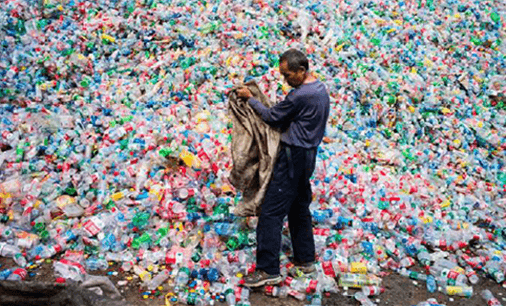 The breakthrough could help solve
the global plastic pollution crisis
by enabling for the first time the full
recycling of bottles.
The new research was spurred by
the discovery in 2016 of the first bacterium
that had naturally evolved to
eat plastic, at a waste dump in Japan.
Scientists have now revealed the detailed
structure of the crucial enzyme
produced by the bug.
The international team then
tweaked the enzyme to see how it
had evolved, but tests showed they
had inadvertently made the molecule
even better at breaking down the PET
(polyethylene terephthalate) plastic
used for soft drink bottles. “What actually
turned out was we improved the
enzyme, which was a bit of a shock,”
said Prof John McGeehan, at the University
of Portsmouth, UK, who led the
research. “It’s great and a real finding.”
The mutant enzyme takes a few
days to start breaking down the plastic
–far faster than the centuries it takes
in the oceans. But the researchers are
optimistic this can be speeded up even
further and become a viable largescale
process.
“What we are hoping to do is use
this enzyme to turn this plastic back
into its original components, so we
can literally recycle it back to plastic,”
said McGeehan.
The breakthrough could help solve
the global plastic pollution crisis
by enabling for the first time the full
recycling of bottles.
The new research was spurred by
the discovery in 2016 of the first bacterium
that had naturally evolved to
eat plastic, at a waste dump in Japan.
Scientists have now revealed the detailed
structure of the crucial enzyme
produced by the bug.
The international team then
tweaked the enzyme to see how it
had evolved, but tests showed they
had inadvertently made the molecule
even better at breaking down the PET
(polyethylene terephthalate) plastic
used for soft drink bottles. “What actually
turned out was we improved the
enzyme, which was a bit of a shock,”
said Prof John McGeehan, at the University
of Portsmouth, UK, who led the
research. “It’s great and a real finding.”
The mutant enzyme takes a few
days to start breaking down the plastic
–far faster than the centuries it takes
in the oceans. But the researchers are
optimistic this can be speeded up even
further and become a viable largescale
process.
“What we are hoping to do is use
this enzyme to turn this plastic back
into its original components, so we
can literally recycle it back to plastic,”
said McGeehan.
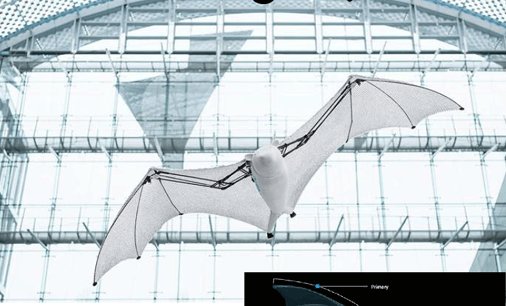
 They make a range of incredibly realistic
prosthetics. Aesthetic prostheses
are plastic sculptures that simulate
parts of the body; they cover up the
missing part and obtain aesthetic
balance. This aids the amputee in
integrating himself in his social, family,
and work environments. Each
prosthesis is silicon-based which
means they’re elastic and resistant to
breaking.
Every one is custom made and
hand-painted, the process takes days
to complete. Each finger has matching
fingerprints and realistic veins and
freckles.
The ears and other prosthetics are
attached using medical glue. The glue
lasts up to 7 days and is shower proof.
The name of the company comes
from Celtic mythology.
They make a range of incredibly realistic
prosthetics. Aesthetic prostheses
are plastic sculptures that simulate
parts of the body; they cover up the
missing part and obtain aesthetic
balance. This aids the amputee in
integrating himself in his social, family,
and work environments. Each
prosthesis is silicon-based which
means they’re elastic and resistant to
breaking.
Every one is custom made and
hand-painted, the process takes days
to complete. Each finger has matching
fingerprints and realistic veins and
freckles.
The ears and other prosthetics are
attached using medical glue. The glue
lasts up to 7 days and is shower proof.
The name of the company comes
from Celtic mythology.
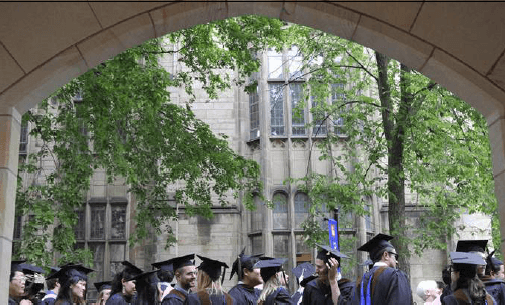 Happiness, they say, is infectious.
Perhaps that is why the most
popular course ever to be taught at
Yale University —this semester enrolling
1,200 students, or a quarter of the
undergraduate student body— is one
titled “Psychology and the Good Life.”
PSYC 157, or “Laurie Santos’ happiness
class” as it is affectionately known
on Yale’s campus, teaches practical
advice such as how to pick a meaningful
career and how to separate satisfying
pursuits from hollow ones. And
now, an expanded version of the class,
filmed in Santos’ own house, is available
for free on Coursera as part of a
seminar-style series on “the science of
well-being.”
As Quartz’s Jenny Anderson noted
in January, courses on happiness are
cropping up everywhere across the US.
The factors —like the country’s political
upheaval and the burgeoning discourse
on mental health in high-pressure
settings like elite universities— are
not hard to discern. Santos says the
message behind her course resonates
with students (and perhaps people of
all ages, in general) who are striving to
reconcile academic and professional
rigor with social connectedness and
life satisfaction.
“I think students are looking for
meaning,” Yale president Peter Salovey,
himself a pioneer in emotionalintelligence
research, told Quartz at
the World Economic Forum in Davos
this year.
Happiness, they say, is infectious.
Perhaps that is why the most
popular course ever to be taught at
Yale University —this semester enrolling
1,200 students, or a quarter of the
undergraduate student body— is one
titled “Psychology and the Good Life.”
PSYC 157, or “Laurie Santos’ happiness
class” as it is affectionately known
on Yale’s campus, teaches practical
advice such as how to pick a meaningful
career and how to separate satisfying
pursuits from hollow ones. And
now, an expanded version of the class,
filmed in Santos’ own house, is available
for free on Coursera as part of a
seminar-style series on “the science of
well-being.”
As Quartz’s Jenny Anderson noted
in January, courses on happiness are
cropping up everywhere across the US.
The factors —like the country’s political
upheaval and the burgeoning discourse
on mental health in high-pressure
settings like elite universities— are
not hard to discern. Santos says the
message behind her course resonates
with students (and perhaps people of
all ages, in general) who are striving to
reconcile academic and professional
rigor with social connectedness and
life satisfaction.
“I think students are looking for
meaning,” Yale president Peter Salovey,
himself a pioneer in emotionalintelligence
research, told Quartz at
the World Economic Forum in Davos
this year.
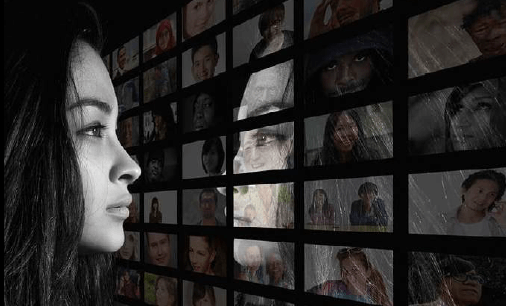

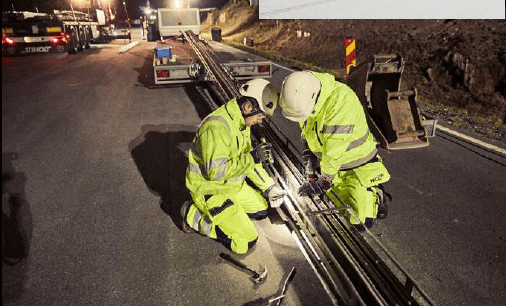 The road stretches for 1.2 miles between
Stockholm and Arlanda Airport
and charges vehicles as they move.
The small piece of road, which reportedly
cost more than $1 million per km to
build, runs via a system of underground
rails that transfer electricity to cars. A
movable arm rises out of the road and
attaches to the underside of cars to pass
the charge. Hans Säll, chief executive
of eRoadArlanda told the Guardian:
“There is no electricity on the surface.
There are two tracks, just like an outlet
in the wall. Five or six centimeters
down is where the electricity is.”
The rails are only powered when
a vehicle is moving, and the system
can track how much energy is used
by each car and pass along the costs
to the corresponding vehicle and
user. Sweden says it plans to outfit
more of its roads with the technology
—good news for anyone who’s
had to plan their trip around finding
a charging station.
The road stretches for 1.2 miles between
Stockholm and Arlanda Airport
and charges vehicles as they move.
The small piece of road, which reportedly
cost more than $1 million per km to
build, runs via a system of underground
rails that transfer electricity to cars. A
movable arm rises out of the road and
attaches to the underside of cars to pass
the charge. Hans Säll, chief executive
of eRoadArlanda told the Guardian:
“There is no electricity on the surface.
There are two tracks, just like an outlet
in the wall. Five or six centimeters
down is where the electricity is.”
The rails are only powered when
a vehicle is moving, and the system
can track how much energy is used
by each car and pass along the costs
to the corresponding vehicle and
user. Sweden says it plans to outfit
more of its roads with the technology
—good news for anyone who’s
had to plan their trip around finding
a charging station.
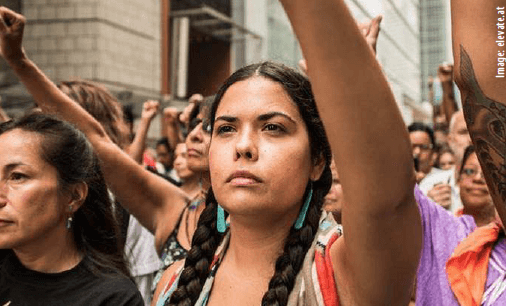 Still invisible and often an afterthought,
indigenous peoples are
uniting to protect the world’s water,
lands and history –while trying to heal
from genocide and ongoing inequality.
Tribal attorney and Couchiching First
Nation citizen Tara Houska chronicles
the history of attempts by government
and industry to eradicate the legitimacy
of indigenous peoples’ land and
culture, including the months-long
standoff at Standing Rock which rallied
thousands around the world. “It’s
incredible what you can do when you
stand together,” Houska says. “Stand
with us –empathize, learn, grow,
change the conversation.”
Here is an excerpt of her TED Talk.
“My name is Tara Houska, I’m bear
clan from Couchiching First Nation,
I was born under the Maple Sapping
Moon in International Falls, Minnesota,
and I’m happy to be here with all of you.
Trauma of indigenous peoples has
trickled through the generations.
Centuries of oppression, of isolation, of
invisibility, have led to a muddled understanding
of who we are today. In 2017,
we face this mixture of Indians in headdresses
going across the plains but also
the drunk sitting on a porch somewhere
you never heard of, living off government
handouts and casino money. ...
We face this constant barrage of
unteaching the accepted narrative.”
Still invisible and often an afterthought,
indigenous peoples are
uniting to protect the world’s water,
lands and history –while trying to heal
from genocide and ongoing inequality.
Tribal attorney and Couchiching First
Nation citizen Tara Houska chronicles
the history of attempts by government
and industry to eradicate the legitimacy
of indigenous peoples’ land and
culture, including the months-long
standoff at Standing Rock which rallied
thousands around the world. “It’s
incredible what you can do when you
stand together,” Houska says. “Stand
with us –empathize, learn, grow,
change the conversation.”
Here is an excerpt of her TED Talk.
“My name is Tara Houska, I’m bear
clan from Couchiching First Nation,
I was born under the Maple Sapping
Moon in International Falls, Minnesota,
and I’m happy to be here with all of you.
Trauma of indigenous peoples has
trickled through the generations.
Centuries of oppression, of isolation, of
invisibility, have led to a muddled understanding
of who we are today. In 2017,
we face this mixture of Indians in headdresses
going across the plains but also
the drunk sitting on a porch somewhere
you never heard of, living off government
handouts and casino money. ...
We face this constant barrage of
unteaching the accepted narrative.”
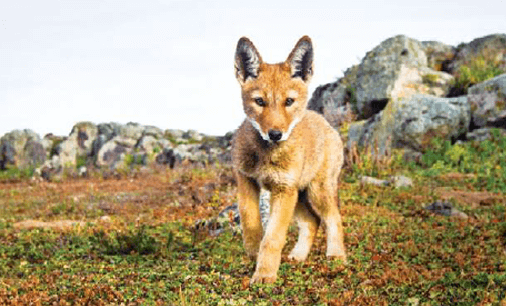 Deep in the Bale Mountains of
Ethiopia, wildlife workers trek up
above 9,800 feet to save some of the
world’s most rare carnivores, Ethiopian
wolves.
“It’s cold, tough work,” says Eric
Bedin, who leads the field monitoring
team in its uphill battle.
In this sparse, sometimes snowy
landscape, the lanky and gingercolored
wolves (Canis simensis) reign
as the region’s apex predators. Yet the
combined threats of rabies, canine
distemper and habitat reduction have
the animals cornered.
Bedin and his colleagues, traveling
by horse and on foot through dramatically
shifting temperatures and weather,
track these solitary hunters for
weeks at a time. Team members know
every wolf in most packs in these mountains. The team has vaccinated
some wolves against rabies, only to
have hopes dashed when the animals
died of distemper months later.
“These guys work their asses off to
protect these wolves,” says Claudio
Sillero, a conservation biologist at the
University of Oxford who heads up the
Ethiopian Wolf Conservation Programme,
of which the field monitoring
team is an integral part. Down the line,
humans stand to benefit from all this
work too.
Sillero and his colleagues have been
at this for 30 years. They’ve seen four
major outbreaks of rabies alone, each
leaving dozens of carcasses across the
highlands and cutting some populations
by as much as 75 percent.
Deep in the Bale Mountains of
Ethiopia, wildlife workers trek up
above 9,800 feet to save some of the
world’s most rare carnivores, Ethiopian
wolves.
“It’s cold, tough work,” says Eric
Bedin, who leads the field monitoring
team in its uphill battle.
In this sparse, sometimes snowy
landscape, the lanky and gingercolored
wolves (Canis simensis) reign
as the region’s apex predators. Yet the
combined threats of rabies, canine
distemper and habitat reduction have
the animals cornered.
Bedin and his colleagues, traveling
by horse and on foot through dramatically
shifting temperatures and weather,
track these solitary hunters for
weeks at a time. Team members know
every wolf in most packs in these mountains. The team has vaccinated
some wolves against rabies, only to
have hopes dashed when the animals
died of distemper months later.
“These guys work their asses off to
protect these wolves,” says Claudio
Sillero, a conservation biologist at the
University of Oxford who heads up the
Ethiopian Wolf Conservation Programme,
of which the field monitoring
team is an integral part. Down the line,
humans stand to benefit from all this
work too.
Sillero and his colleagues have been
at this for 30 years. They’ve seen four
major outbreaks of rabies alone, each
leaving dozens of carcasses across the
highlands and cutting some populations
by as much as 75 percent.

 Features a reproduction
of the artwork Solid Fist (2017) by Japanese
painter, sculptor and draughtsman
Yoshitomo Nara.
store.moma.org
Features a reproduction
of the artwork Solid Fist (2017) by Japanese
painter, sculptor and draughtsman
Yoshitomo Nara.
store.moma.org
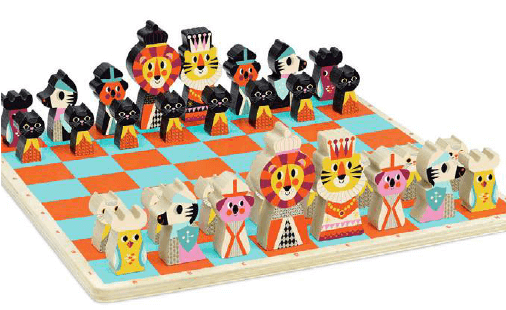 Animal-themed chess set for children. Comes with a convenient
storage bag. Made by Vilac. Ages 6+.
Animal-themed chess set for children. Comes with a convenient
storage bag. Made by Vilac. Ages 6+.
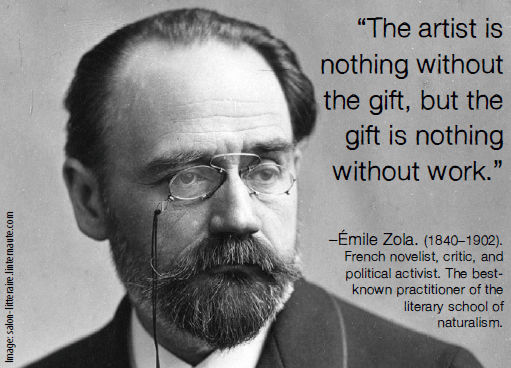 “The artist is
nothing without
the gift, but the
gift is nothing
without work.”
“The artist is
nothing without
the gift, but the
gift is nothing
without work.” 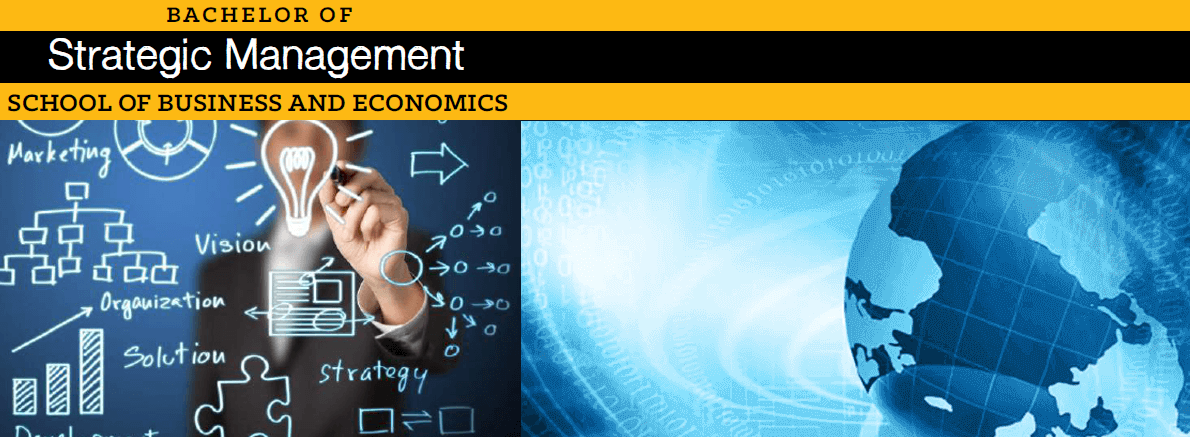 The Bachelor’s degree in Strategic
Management program is offered
online via distance learning. After
evaluating both academic record and
life experience, AIU staff working in
conjunction with Faculty and Academic
Advisors will assist students in
setting up a custom-made program,
designed on an individual basis. This
flexibility to meet student needs is seldom
found in other distance learning
programs. Our online program does not
require all students to take the same
subjects/courses, use the same books,
or learning materials. Instead, the online
Bachelor of Strategic Management
curriculum is designed individually
by the student and academic advisor.
It specifically addresses strengths and
weaknesses with respect to market opportunities
in the student’s major and
intended field of work. Understanding
that industry and geographic factors
should influence the content of the
curriculum instead of a standardized
one-fits-all design is the hallmark of
AIU’s unique approach to adult education.
This philosophy addresses the
dynamic and constantly changing environment
of working professionals by
helping adult students in reaching their
professional and personal goals within
the scope of the degree program.
The Bachelor’s degree in Strategic
Management program is offered
online via distance learning. After
evaluating both academic record and
life experience, AIU staff working in
conjunction with Faculty and Academic
Advisors will assist students in
setting up a custom-made program,
designed on an individual basis. This
flexibility to meet student needs is seldom
found in other distance learning
programs. Our online program does not
require all students to take the same
subjects/courses, use the same books,
or learning materials. Instead, the online
Bachelor of Strategic Management
curriculum is designed individually
by the student and academic advisor.
It specifically addresses strengths and
weaknesses with respect to market opportunities
in the student’s major and
intended field of work. Understanding
that industry and geographic factors
should influence the content of the
curriculum instead of a standardized
one-fits-all design is the hallmark of
AIU’s unique approach to adult education.
This philosophy addresses the
dynamic and constantly changing environment
of working professionals by
helping adult students in reaching their
professional and personal goals within
the scope of the degree program.
 Atlantic International University is accredited by the Accreditation Service for International
Schools, Colleges and Universities (ASIC). ASIC Accreditation is an internationally
renowned quality standard for colleges and universities. Visit ASIC’s Directory of Accredited
Colleges and Universities. ASIC is a member of CHEA International Quality Group (CIQG) in
the USA, an approved accreditation body by the Ministerial Department of the Home Office in the UK,
and is listed in the International Directory of the Council for Higher Education Accreditation (CHEA).
AIU meets all state and federal laws as a degree-granting institution in the United States and the State of
Hawaii. The University was legally established by corporate charter in 1998 and is in good standing.
Atlantic International University is accredited by the Accreditation Service for International
Schools, Colleges and Universities (ASIC). ASIC Accreditation is an internationally
renowned quality standard for colleges and universities. Visit ASIC’s Directory of Accredited
Colleges and Universities. ASIC is a member of CHEA International Quality Group (CIQG) in
the USA, an approved accreditation body by the Ministerial Department of the Home Office in the UK,
and is listed in the International Directory of the Council for Higher Education Accreditation (CHEA).
AIU meets all state and federal laws as a degree-granting institution in the United States and the State of
Hawaii. The University was legally established by corporate charter in 1998 and is in good standing.
 If a student outside the U.S. wishes to carry
out a particular procedure within a country’s
Department of Education regarding their
degree earned at AIU, such procedures are to
be carried out independently by the student.
AIU respects the unique rules and regulations
of each country and does not intervene or
influence the respective authorities. We
recommend prospective students who
intend to carry out such procedures
outside the U.S. to verify in detail the
steps and requirements needed in
order to be fully informed.
If a student outside the U.S. wishes to carry
out a particular procedure within a country’s
Department of Education regarding their
degree earned at AIU, such procedures are to
be carried out independently by the student.
AIU respects the unique rules and regulations
of each country and does not intervene or
influence the respective authorities. We
recommend prospective students who
intend to carry out such procedures
outside the U.S. to verify in detail the
steps and requirements needed in
order to be fully informed.
 The School of Business and Economics
allows aspiring and practicing
professionals, managers, and entrepreneurs
in the private and public sectors
to complete a self paced distance
learning degree program of the highest
academic standard.
The ultimate goal is to empower
learners and help them take advantage
of the enormous array of resources
from the world environment in order
to eliminate the current continuum of
poverty and limitations.
Degree programs are designed for
those students whose professional experience has been in business,
marketing, administration, economics,
finance and management.
The School of Business and Economics
allows aspiring and practicing
professionals, managers, and entrepreneurs
in the private and public sectors
to complete a self paced distance
learning degree program of the highest
academic standard.
The ultimate goal is to empower
learners and help them take advantage
of the enormous array of resources
from the world environment in order
to eliminate the current continuum of
poverty and limitations.
Degree programs are designed for
those students whose professional experience has been in business,
marketing, administration, economics,
finance and management.
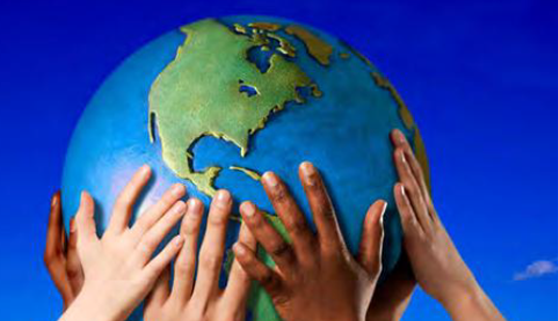 The School of Social and Human Studies
is focused on to the development of
studies which instill a core commitment
to building a society based on social and
economic justice and enhancing opportunities
for human well being.
The founding principles lie on the
basic right of education as outlined
in the Declaration of Human Rights.
We instill in our students a sense of
confidence and self reliance in their
ability to access the vast opportunities
available through information channels,
the world wide web, private, public,
nonprofit, and nongovernmental organizations in an ever expanding
global community.
Degree programs are aimed towards
those whose professional life has been
related to social and human behavior,
with the arts, or with cultural studies.
The School of Social and Human Studies
is focused on to the development of
studies which instill a core commitment
to building a society based on social and
economic justice and enhancing opportunities
for human well being.
The founding principles lie on the
basic right of education as outlined
in the Declaration of Human Rights.
We instill in our students a sense of
confidence and self reliance in their
ability to access the vast opportunities
available through information channels,
the world wide web, private, public,
nonprofit, and nongovernmental organizations in an ever expanding
global community.
Degree programs are aimed towards
those whose professional life has been
related to social and human behavior,
with the arts, or with cultural studies.
 The School of Science and Engineering
seeks to provide dynamic, integrated,
and challenging degree programs
designed for those whose experience
is in industrial research, scientific production,
engineering and the general
sciences. Our system for research and
education will keep us apace with the
twenty-first century reach scientific
advance in an environmentally and
ecologically responsible manner to allow
for the sustainability of the human
population. We will foster among our
students a demand for ethical behavior,
an appreciation for diversity, an understanding
of scientific investigation,
The School of Science and Engineering
seeks to provide dynamic, integrated,
and challenging degree programs
designed for those whose experience
is in industrial research, scientific production,
engineering and the general
sciences. Our system for research and
education will keep us apace with the
twenty-first century reach scientific
advance in an environmentally and
ecologically responsible manner to allow
for the sustainability of the human
population. We will foster among our
students a demand for ethical behavior,
an appreciation for diversity, an understanding
of scientific investigation,
 With access to a global catalog created and maintained collectively by more than
9,000 participating institutions, AIU students have secured excellent research
tools for their study programs.
With access to a global catalog created and maintained collectively by more than
9,000 participating institutions, AIU students have secured excellent research
tools for their study programs.